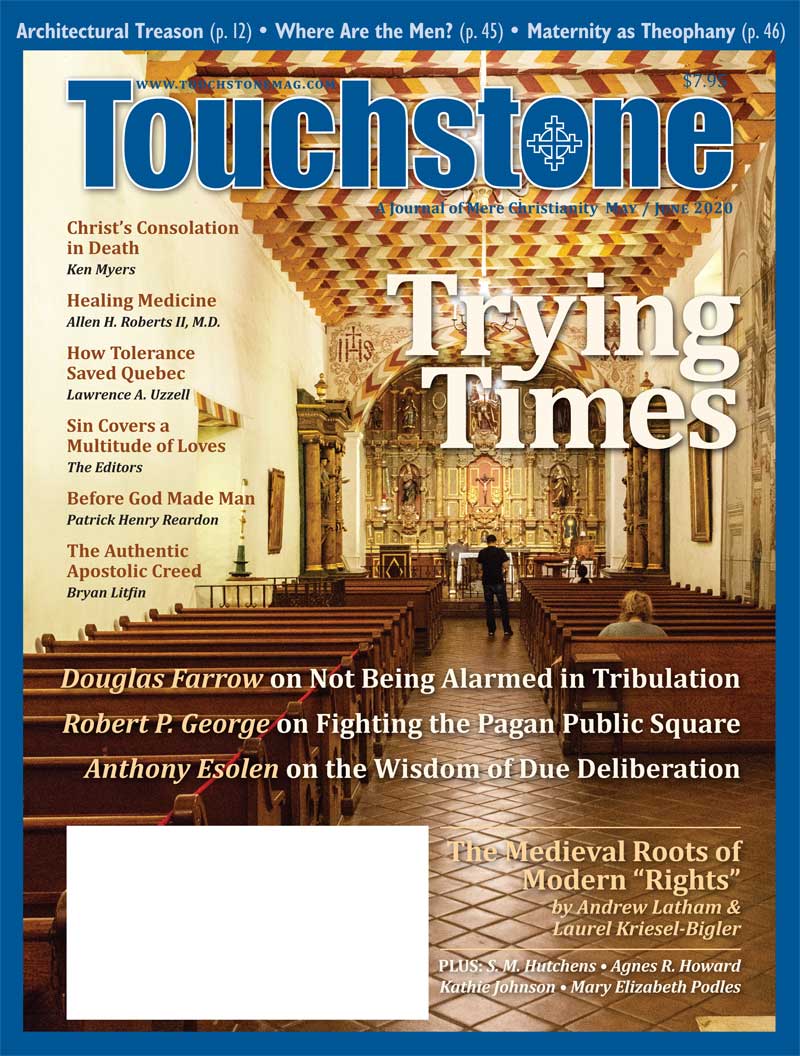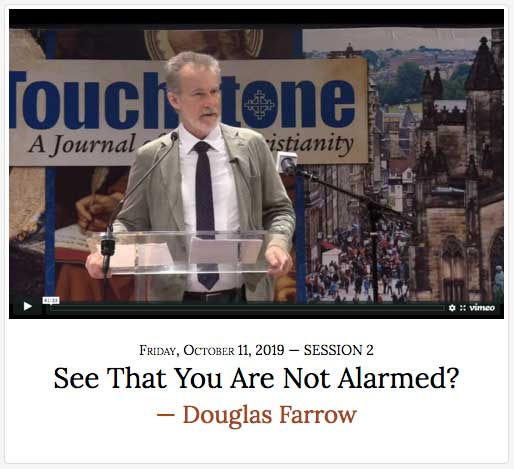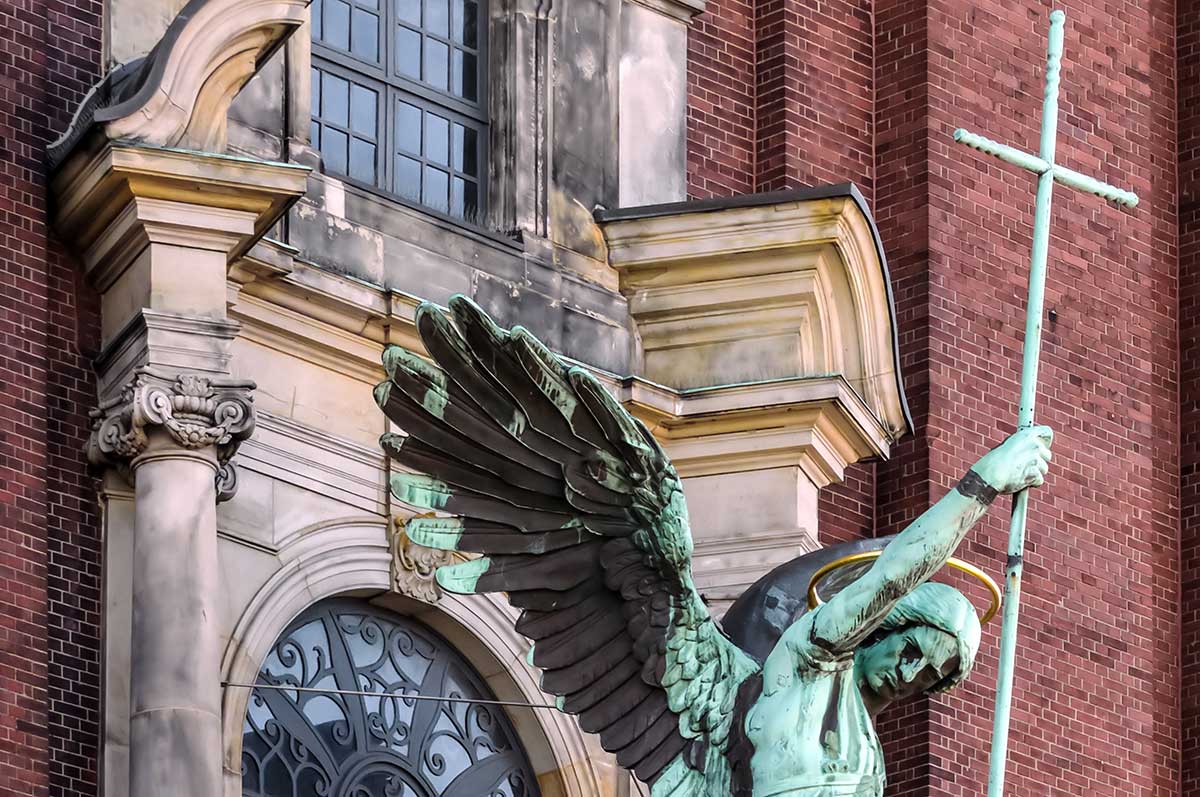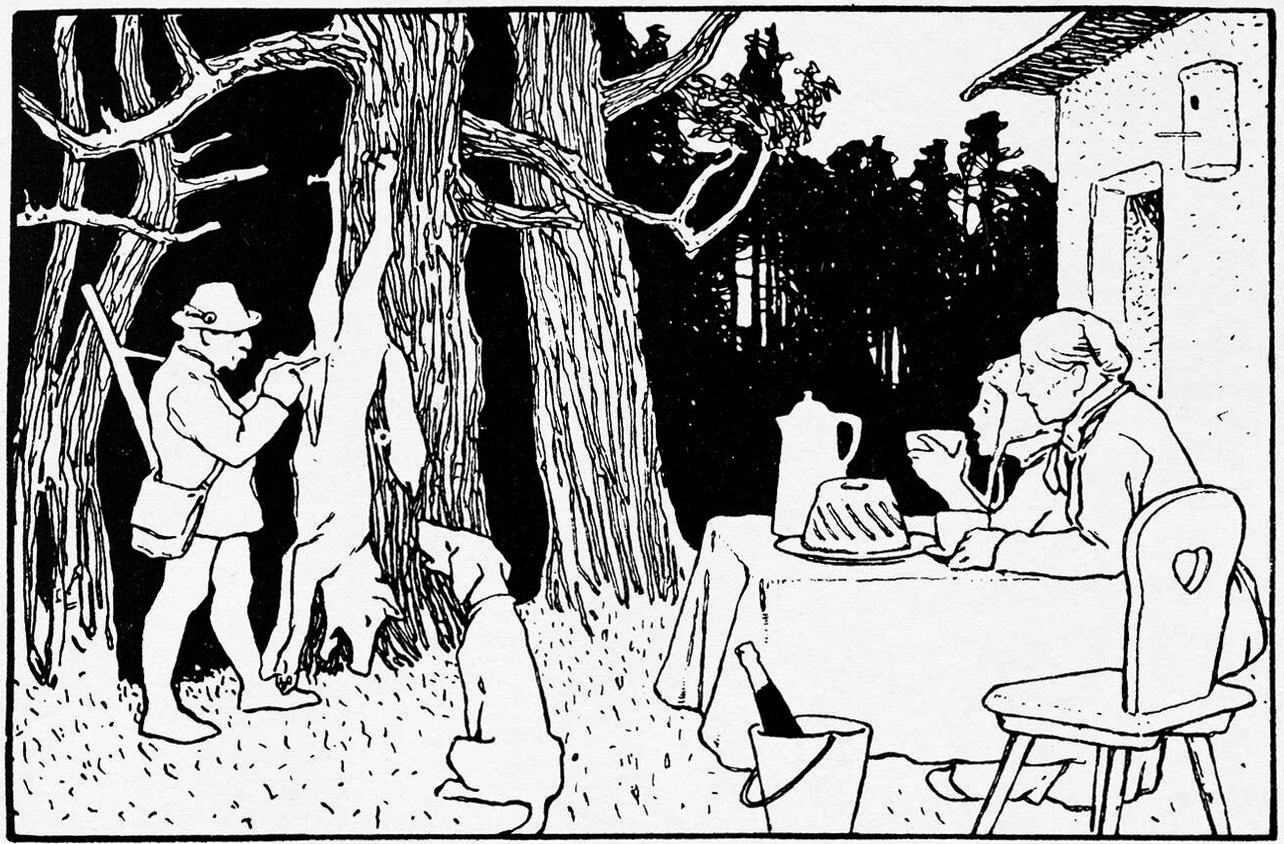2019 Conference Talk
See That You Are Not Alarmed?
On Flight & Fight in the Present Tribulation
Fight or flight? That can be a paralyzing and, as such, fatal question. Should we not always be fighting, fighting the good fight of faith? And should we not always be prepared to flee, if the fleeing is strategic rather than cowardly? Our Lord, in the same discourse, said both "See that you are not alarmed, for this is not yet the end," and "When you see the abomination that brings desolation, flee to the hills and pray that your flight not be in winter!"
The first piece of advice comes as a warning against premature flight, flight that is not strategic. Strategic flight is fine. For example: Jesus removing himself from angry mobs in his home territory. Or Paul going over the wall in a basket to escape plots against him in Damascus, or fleeing Thessalonica in mid-mission to avoid consequences that might have put an early end to his mission. This is flight, all right, but it is flight as fight.
And here we might consider also less dramatic forms of flight that count, strategically, as fight. Perhaps you recall Genesis 26?
And Isaac sowed in that land, and reaped in the same year a hundredfold. The Lord blessed him, and the man became rich, and gained more and more until he became very wealthy. He had possessions of flocks and herds, and a great household, so that the Philistines envied him. . . . And Abimelech said to Isaac, "Go away from us; for you are much mightier than we."
So Isaac departed . . . and encamped in the valley of Gerar and dwelt there. And Isaac dug again the wells of water which had been dug in the days of Abraham his father; for the Philistines had stopped them after the death of Abraham. . . . But when Isaac's servants dug in the valley and found there a well of springing water, the herdsmen of Gerar quarrelled with Isaac's herdsmen, saying, "The water is ours." So he called the name of the well Esek, because they contended with him. Then they dug another well, and they quarrelled over that also; so he called its name Sitnah. And he moved from there and dug another well, and over that they did not quarrel; so he called its name Rehoboth, saying, "For now the Lord has made room for us, and we shall be fruitful in the land." (12–22)
Esek, contention; Sitnah, enmity; Rehoboth, broad places—Lebensraum, if we may use that tainted term, room to keep on sowing, watering, reaping, being fruitful.
For the most part, I think that is what we should presently be about: digging Rehoboth, carving out space to be fruitful. We invented public education, not only in the monastic schools of Europe in the Middle Ages but here in North America under the likes of Bishop Laval. We invented hospices and then hospitals, and spread them throughout the land. And what has happened to all this? Colonized by the state and, just so, by today's culture of sex and death through manipulation of and by the state.
Esek and Sitnah! In our schools, children are taught by foolish and perverted people to become foolish and perverted, if indeed they are taught anything at all. In our hospitals, "Do no harm" is no longer medicine's first principle or even an operative principle. In our hospices, death is no longer natural but more and more frequently an act of suicide or murder. We cannot go on this way, subjecting the most vulnerable members of our community to the Destroyer and his minions. We should fight for these institutions where there is, in God, hope of victory. But I think we must also be about the equally demanding business of moving on from what has been confiscated, digging new wells in education and in medicine, making new places where truth may flourish and life be respected from cradle to grave.
Where We Must Fight
That, obviously, is labor-intensive. Just as obviously, it requires enormous financial commitment. And it faces another problem: regulation. For we cannot have our schools or hospitals and hospices, or even our private businesses—perhaps we can barely have our churches any more—unless we toe the line drawn for us in the law itself by the culture of sex and death. We no longer make laws for ourselves. Law is made for us and often against us. Now, we should not forget that law as we know it, and respect for law as we know it, was also largely a Christian work, an ecclesial work, albeit one based on the reorganization and recontextualization of Roman law. But law, too, has been confiscated by those who know nothing but positive law, who neglect natural and divine law, who indeed make it against the law to acknowledge that there is such a thing as natural or divine law and to act accordingly.
Here we cannot fly! We must fight. We must fight for the right to eat at our own table, not at the state's table. This begins with a polite request to the relevant authorities, as in Daniel 1. But if necessary it must be followed up with civil disobedience, as in Daniel 3. For we cannot bow down to the golden image of the worldly potentate, even if that image is garbed in democratic dress. Where positive law tells us we must ignore natural and divine law, there we must exercise again the disobedience of the civil rights era, the era whose own achievements have been colonized today in our new era of fabricated rights, rights not only to be corrupt but to corrupt others and to coerce them into material, if not formal, cooperation with evil. We must remember what was affirmed to us by Thomas Aquinas and Leo XIII and repeated by Martin Luther King, Jr.; namely, that where positive law contradicts natural or divine law, it loses its power as law to bind the conscience.
You have in these United States of America some frankly criminal states, as do your neighbors to the north: states that not only permit but mandate morally unlawful acts such as abortion and euthanasia or the mutilation of children, to say nothing of the mutilation of reason, of language, and of the social standards essential to cohesion. These states must be resisted, not merely complained about. Not by violence or by any deceitful means. Rather with truth, with weapons of righteousness in the right hand and in the left, with martyrial passion. The genuine successes of the civil rights era were won by the latter weapons, not by the former. The former is not morally permissible. It is never licit to do evil in order that good may come.
Do not forget this! It is a fundamental moral principle that must be applied whenever we are tempted to meet violence with violence, deceit with deceit, slander with slander. Or when, on the other hand, we are tempted to say: "I will cooperate with evil, or even pretend that it is not evil but just an unfortunate fact of life, so as to bring about the good of maintaining my position of influence, earning a living, feeding my family, enjoying my retirement." It is licit to prefer one good to another, so long as all goods are ordered to God and all things are arranged in fulfillment of the commandment to love God without reservation and to love one's neighbor as oneself. But it is never licit to do evil that good may come.
That said, through civil labor and even through civil disobedience, if necessary, we must bend civil law back into shape. We must at the very least demand that it leave us Lebensraum, that it be capacious enough for us to survive, if not to flourish: to have our own schools and hospitals and community standards, our own philosophy and theology and art, our own freedom to construct communities that are not subject to bureaucrats and busy-bodies telling us that we must sacrifice our young to the culture of sex, our old or infirm to the culture of death, and all to the great quest for autonomy—which after all is nothing but the quest of the Serpent himself, the quest on which he set our race long ago in the garden.
Civil disobedience can be undertaken individually, and sometimes it must be. But it is generally more effective as a corporate strategy. It is time for lay and clerical leaders—those who are prepared to pay the price—to lay plans for it. The alternative is an unthinkable abandonment of our children and a grave breach of obedience to the two great commandments. The law has been weaponized against God, the source and summit of law. It has been weaponized by and for the Serpent and his would-be autonomous woman or man. It is time to say so, and to act on what is said.
I will leave that there, though I think it the challenge immediately pending. I want to speak to you now about what I will call "the last fight," and about that time for flight of which our Lord spoke in his second piece of advice.
The Last Fight
I mentioned Daniel. We turn now to our Lord's reiteration of Daniel's message in the so-called Little Apocalypse, also known as the Olivet Discourse, recorded in Matthew 24 and parallels. Let's listen in:
As he sat on the Mount of Olives, the disciples came to him privately, saying, "Tell us, when will this be, and what will be the sign of your coming and of the close of the age?" And Jesus answered them, "Take heed that no one leads you astray. For many will come in my name, saying, 'I am the Christ,' and they will lead many astray. And you will hear of wars and rumors of wars; see that you are not alarmed; for this must take place, but the end is not yet. For nation will rise against nation, and kingdom against kingdom, and there will be famines and earthquakes in various places: all this is but the beginning of the sufferings. Then they will deliver you up to tribulation, and put you to death; and you will be hated by all nations for my name's sake. And then many will fall away, and betray one another, and hate one another. And many false prophets will arise and lead many astray. And because wickedness is multiplied, most men's love will grow cold. But he who endures to the end will be saved. And this gospel of the kingdom will be preached throughout the whole world, as a testimony to all nations; and then the end will come." (Matt. 24:3–14)
Jesus has just predicted the temple's destruction, a prophecy fulfilled in a.d. 70, when the Roman army sacked Jerusalem. That apocalyptic event would reveal the end of the age that had begun with the Jews' return from exile. It would also reveal the truth about what had been done in Jerusalem by those who crucified Jesus. The course they were on could only come to a grinding halt—which it did by way of the Great Revolt, led by a motley crew of messianic candidates who were crushed by Titus. After the collapse of their revolt and the destruction of the temple, the alternatives must have seemed very stark. Either the covenant had come to naught or Messiah Jesus had come to life and was ruling over a new age, just as his followers claimed.
Many sought a third alternative, of course, in rabbinic Judaism. But though rabbinic Jews did not know it, and for the most part still do not know it—just as some Christians, alas, do not know it—they were now a people summoned to a new Sinai, to divine service under the consummate form of the covenant. They were still the people of God, but only in indissoluble relation to the Church, to the firstborn of the renewed creation.
Such things Jesus seems to have in view. Clearly, however, he has something more in view. He has in view a process touching not only Israel but all the nations. He has in view an age that will extend to the appointed end of history as we know it. He has in view everything of which Daniel and the prophets spoke. He has in view the spread of the gospel of his kingdom to the ends of the earth and a great revolt against that gospel among the nations and even in his Church, a revolt that will precipitate a twofold coming: the coming of the abomination that brings desolation on the whole earth, not merely on Jerusalem; and the coming of the Son of Man as judge, a coming not by proxy only, as in the tragic events of a.d. 70, but in person—a glorious coming that will bring to an end that agonizing hour of decision with which our own age will conclude. Jesus therefore continues:
So when you see the desolating sacrilege, spoken of by the prophet Daniel, standing in the holy place (let the reader understand), then let those who are in Judea flee to the mountains; let him who is on the housetop not go down to take what is in his house; and let him who is in the field not turn back to take his mantle. And alas for those who are with child and for those who give suck in those days! Pray that your flight may not be in winter or on a Sabbath. For then there will be great tribulation, such as has not been from the beginning of the world until now, no, and never will be. And if those days had not been shortened, no human being would be saved; but for the sake of the elect those days will be shortened. Then if any one says to you, 'Lo, here is the Christ!' or 'There he is!' do not believe it. For false Christs and false prophets will arise and show great signs and wonders, so as to lead astray, if possible, even the elect. Lo, I have told you beforehand. So, if they say to you, 'Lo, he is in the wilderness,' do not go out; if they say, 'Lo, he is in the inner rooms,' do not believe it. For as the lightning comes from the east and shines as far as the west, so will be the coming of the Son of man. . . .
Immediately after the tribulation of those days the sun will be darkened, and the moon will not give its light, and the stars will fall from heaven, and the powers of the heavens will be shaken; then will appear the sign of the Son of man in heaven, and then all the tribes of the earth will mourn, and they will see the Son of man coming on the clouds of heaven with power and great glory; and he will send out his angels with a loud trumpet call, and they will gather his elect from the four winds, from one end of heaven to the other. (Matt. 24:15–31)
See that you are not alarmed? Yes. And yet there will be a time to sound the alarm and to beat a hasty retreat if you can. Just as there was a time to flee Sodom before it was destroyed by the Angel of the Lord, or Jerusalem before Titus's legions made their final advance on the city, there will be a time to flee the false, the rebellious, the desperate and desperately wicked realm of antichrist, before the legions of Jesus, those hidden angelic legions that belong to the city of God, make their final advance in judgment upon the city of man. Then indeed "remember Lot's wife"!
Meanwhile, the citizens of the city of God who live in the city of man, be they Jew or Gentile, are to carry the fight by carrying the gospel to the ends of the earth. That means even in Illinois and in other jurisdictions where it is law and policy to slaughter the innocents in the womb and to torment children with lies, jurisdictions where—if any of this is true, if God is not dead and God's Messiah has risen from the dead—judgment is coming as surely as the sun will rise tomorrow. Nay, much more surely, for "after the tribulation of those days the sun will be darkened and the moon will not give its light."
I will say more about that enigmatic metaphor shortly. But let us not lose sight here of the fact that fight, not flight, is what is called for until the very end. This fight is not a fight for the kingdom. The fight for the kingdom has already been fought and won by him who alone could fight and win. It is a fight rather for our neighbors. It is a fight to live and proclaim the gospel, to announce the coming King. It is a fight against the forces of the New Man who, with or without saying so, presents himself as an alternative to the coming King, against the man whose own kingdom will result in the abomination that brings desolation: the desolation of a properly human society; the desolation even of the Church and its Eucharist; and, just so, the desolation of divine judgment that will fall in consequence of this man.
The last fight, in other words, is an age-long fight, albeit one that will reach its climax in the contest with this New Man. It is a fight and a contest we cannot possibly win, yet a contest that he, the New Man, is destined to lose. Let me explain with the help of Paul, lest we somehow fail to understand and so lose heart in this unwinnable yet unlosable fight.
Not Panic but Proclamation
I am thinking of Paul's correspondence with the Thessalonians, from whose city he had fled at the urging of his new converts. In his second letter to them, he echoes the advice of Jesus:
We beg you, brethren, with respect to the parousia of our Lord Jesus Christ and our assembling around him, that you not quickly be shaken from your senses or disturbed, whether by spirit or by word or by letter, supposedly from us, purporting that the day of the Lord has come. (2:1–2)
Paul is alluding, as every Eucharist alludes, to the reuniting with Jesus of all the faithful, be they dead or alive, that will occur when Jesus comes as judge. He has already spoken of that in his first letter. But why does he beg them not to be disturbed or alarmed? Why does he tell them, and us with them, not to panic? Because panic will only drive us off course; it will interfere with our mission; it will spoil our fight.
We must be committed to more than a mere round or two. The fight of which we are speaking is a fight to the finish, and only those aiming to carry it through to the end are worthy of it. The end sometimes seems nigh when it is not, as anyone who has climbed a mountain, literally or metaphorically, knows. We must bear that in mind. God never judges before the time for judgment has fully come, and we mustn't, either. That is why Paul goes on to tell us that the day of the Lord, the day of the disclosure of Jesus the Judge, shall not come
unless the apostasy comes first and the man of lawlessness, the son of destruction, is himself disclosed—the one taking an adversarial stance and exalting himself against everything said to be deity or an object of reverence, even to seating himself in the temple of God as if he were God.
Do you not recall [he asks], that while I was with you I was telling you these things? And now you see what is delaying the day of the Lord, namely, that the man of lawlessness should be revealed in his own proper time. For the mystery of lawlessness is already at work; only there is one presently restraining it until he shall emerge from the midst. And then at last the lawless one will be unveiled, whom the Lord Jesus will destroy with the breath of his mouth and bring down by the display of his own parousia—the one whose parousia is according to the working of Satan, with all demonic power and with false signs and wonders and with every wicked deceit, a parousia unto those who are perishing for want of love of the truth, which they did not receive that it might save them. (3–10; trans. mine)
So: We fight up to that time. We fight even in that time. We fight until the end of that time. And only then, when the alarm is sounded, do we retreat if we are able to retreat. Because we know where things are going, though we do not know how exactly or when exactly they are going to get there—and because we know that our redemption is drawing nigh, however and whenever it will actually arrive—we fight the good fight of faith and we do not give up. We assemble around our Lord sacramentally to gain strength. We go out from there to serve the Lord. And we wait for the Lord.
Lawlessness in the Open
But where are we now? What is our present situation? We are, I fear, beginning to witness the emergence of the mystery of lawlessness into the open. The naked public square is being filled, not only with actual nakedness, but with the doctrines of demons and the hubris of antichrist. Perhaps the man of lawlessness, who is at once a corporate and an individual man (a kind of man, a certain sort of society, and also the leader of that society) is nearer at hand than we would like to think. After all, we have already met instantiations of this man. Hitler was such an instantiation, and he, at the hour of his death, opined that another century should suffice to see the day belonging to "the man who is coming." Perhaps he was wrong about that, or perhaps he was right. In the Church, too, even in Rome at the heart of the Church, we are seeing lawlessness emerge into the open.
Yet even if all this is so, even if the time is at hand—and I do not say that it is at hand, for I do not know—what is our task? To carry out our mission. To announce the coming of Jesus. His first and his second coming, his coming in mercy to save those who had defied his judgment, and his coming in judgment to save those who have not despised his mercy. We are not to panic but to proclaim. We are to do this calmly, albeit urgently; winsomely, but not without warnings. In other words, we are to do what we were told to do from the beginning: "Go therefore and make disciples of all nations, baptizing them in the name of the Father and of the Son and of the Holy Spirit, teaching them to observe all that I have commanded you; and lo, I am with you always, to the close of the age."
God alone knows when the end of the age is, though we ourselves, if we are watching and praying—only if we are watching and praying!—will know that we are at that end when the sun is darkened and the moon no longer gives its light and the standard of the man of lawlessness appears in the sanctuary of God. Then, says Jesus, it will be time to fly. Then, and not before then, though before then we be brought before the tribunals of human judgment and be made to suffer losses, indignities, incarcerations, and martyrdoms. That has been the fate of Christians from the beginning, for from the beginning they have been in training for the last fight. Were those who gave their lives in the days of Nero or Domitian not already fighting both the good fight and the last fight? We should not suppose ourselves in any very fundamentally different situation.
And yet there is no denying that we are nearer the end. Now that the gospel has all but reached the ends of the earth, now that the great revolt, the great apostasy, is underway—and it has been underway already for some centuries—it is more and more the case that what was then a sporadic suffering and martyrdom is becoming steady and widespread. Sometimes it lifts. Sometimes it seems that we may break through to a better world in which such things no longer happen. Sometimes we do see a breakthrough of some kind, which is a cause of great thanksgiving; but it is only a respite. The prophets have told us, our Lord has told us, his apostles have told us how it will be at the last. At the last it will be much as it was at the first, only on a grander scale, a global scale, in a time of great darkness.
Do not panic at that. Rather strengthen and rally each other's faith, "that no one be shaken by these tribulations." For you yourselves know, says Paul to the Thessalonians, "that to such we are appointed." But God, he adds, has destined us not for wrath "but for obtaining salvation through our Lord Jesus Christ, who died on our behalf that, whether we should remain on-watch or have fallen asleep in Christ, we might live together with him when he comes. So carry on as you are, encouraging one another, each supporting the other."
Four Reasons to Travel Light
At the last of the last, it is true, there will be days of tribulation such as have not been before. Minds will already be made up. The mission will be all but over. There will be much martyrial blood. There will be a time for those who can flee to flee. Of that little more can be said, I suppose. God knows whom he will spare, why, and how. We cannot know. What we can know, and what must be said, is that we must learn to travel light.
The First Warning Clause: Signs in the Sun
Here I want to bring to your attention a sermon of St. Vincent Ferrer from some six hundred years ago—Ferrer died in 1419—and indeed to quote from it at length, for it is very instructive. In this Advent homily on the Last Judgment, which you can find in St. Vincent Ferrer: The Angel of the Judgment (Saint Benedict Press, TAN Books), he is working with St. Luke's version of the Olivet Discourse. He writes:
Now among all afflictions, three of the greatest and most terrible are shortly to come upon mankind: first, the affliction of Antichrist, a man but a diabolical one; second, the destruction by fire of the terrestrial world; third, the universal judgment. And with these tribulations the world will come to an end. Therefore, according to the rule of divine Providence . . . before these three, there will be warning signs in the heavens, in the sun and in the moon and in the stars, as is set out in our text.
The first affliction to come on the world in a short space of time is the advent of Antichrist, a diabolical man who will bring distress on the whole world, as is implied in today's gospel, where it is said: "And upon the earth distress of nations, by reason of the confusion of the roaring of the sea and of the waves." In my text [Luke 21:25] there are four clauses in which we are warned of the four ways in which Antichrist will deceive Christians. . . .
The first clause tells us that there will be signs in the sun in the time of Antichrist; that is, there will be signs in Christ, and the precise sign is given by Saint Matthew saying: "The sun will not give its light." Such darkening does not happen with regard to the sun itself, for it is not in the nature of the sun to be darkened in itself. But by the interposition of clouds and vapor between the sun and the earth, the sun appears to be obscured. In the same way, in the time of Antichrist, the Sun of justice will be obscured by the interposition of temporal goods and the wealth which Antichrist will bestow on the world, inasmuch as the brightness of faith in Jesus Christ and the glow of good lives will no longer shine among Christians. For, lest they should lose their dominion, temporal rulers, kings and princes will range themselves on the side of Antichrist. In like manner, prelates for fear of losing their dignities, and religious and priests to gain honors and riches, will forsake the Faith of Christ and adhere to Antichrist.
Ferrer now faces a question that, unless I miss my guess, is on our own hearts also. It is the "Why?" question.
I am asked why God permits this error among Christians, since He is God and the strongest cannot stand against Him? I answer by a dictum of theology taken from the Book of Wisdom: By what things a man sins, by the same also is he tormented. How do the peoples of the world sin against God today? They sin in order to gain honors, dignities and riches. Therefore, by honors, riches and dignities, God permits that Antichrist shall deceive them. If therefore you do not wish to be deceived, now with all your hearts contemn and despise all earthly goods, and long for those of heaven, considering that the goods of this world are transitory and empty, while heavenly and celestial goods are eternal. In this way you will be strong. Saint John gives this counsel: "Love not the world nor the things that are in the world. If any man loves the world the charity of the Father is not in him. And the world passeth and the concupiscence thereof."
Permit me to intervene here. Is St. Vincent not advising us to travel light? If we love too much the things of this world, if we are too much encumbered by the things of this world, how will we fight properly? How will we stay focused on the things of the world to come? How will we not panic, or perhaps even concede the fight and go over to the enemy, when we see those things we love too much being threatened?
The Second Clause: Signs in the Moon
"The second clause," he continues, "says that there will be signs in the moon."
You must understand that in the Holy Scriptures the moon signifies our holy Mother the Universal Church. . . . The Church is signified by the moon and its five phases: first there is the new moon, then the waxing moon, next the full moon, to be followed by the waning moon, and lastly the old moon. The Church passes through these phases. The new moon signifies the Church of Christ in His own time. . . . The full moon typifies the acceptance of the Gospel of Christ in every part of the world, in every kingdom and province. . . . The waning moon typifies the inability of men to preserve what the Apostles had acquired. . . . The old moon, because the horns are reversed, typifies that the Church is no longer in the state in which Christ founded it.
Christ founded the Church in great lowliness and poverty; now all this is turned round to pride, pomp and vanity, as may be easily seen in every rank of the Church. Mercy and liberality are changed into simony, usury and rapine; chastity becomes licentiousness, uncleanness and corruption; the brightness of virtue is changed into envy and malignity; temperance has become gluttony and voracity; patience has given place to anger, war and divisions among the peoples; diligence is superseded by negligence. Nothing is now left to make matters worse but an eclipse which is caused by the interposition of the earth between the sun and moon such as only occurs at full moon. As Isaiah says: "Your sins have put a division between us."
In the time of Antichrist, the Church, typified by the moon, will be eclipsed; because then she will not give her light, since Christians will no longer work miracles by reason of their sanctity; but Antichrist and his followers will work miracles, not true miracles, but false ones having the appearance of true miracles, in order that they may deceive the people. . . . And the Church, typified by the moon, will perform no miracles. . . . Christ has warned us of these false miracles and signs, saying: "There will arise false christs and false prophets." That is to say, the sons of Christians who have already made shipwreck of their faith owing to the gifts of Antichrist. As Saint Matthew says: "And they will show great signs and wonders in so much to deceive, if possible, even the elect. Behold I have told you beforehand."
Ferrer now repeats the question asked earlier, and restates the principle he wants to drum into us:
Suppose someone should ask, why does Christ permit these works of destruction of Christianity by the devil? I answer according to the rule of theology: By what things a man sins, by the same also is he tormented. Since the people of the world sin against God by having recourse to the works of the devil . . . therefore God permits them to be deceived by the works of the demons. If you do not wish to be deceived, then place the whole of your faith and confidence in the name of Jesus Christ, and refuse to acknowledge any miracle unless it is worked in that same name; and so you will be strong against seduction. David says: "Blessed is the man whose hope is in the name of the Lord; and who hath not regard to vanities and lying follies." The name of the Lord is Jesus. . . . Antichrist arrogates to himself every other name of Christ, but as many of the saints tell us, he flies from the name of Jesus. Therefore, for that reason, the name of Jesus should receive the greatest respect from all Christians.
To intervene a second time: Pay close attention to this rule of moral theology, drawn from Wisdom 11:16, and "learn that one is punished by the very things by which one sins." For this belongs to divine justice, which also dictates that the righteous shall receive benefit in their need "through the very things by which their enemies are punished" (Wis. 11:4–5). Let us never suppose, then, either that our own sins will have no consequences or, on the other hand, that God's good purposes can be stymied by the sins and outrages of man.
The Third Clause: Signs in the Stars
Now "the third clause says that there will be signs in the stars." What are we to make of that?
In the Sacred Scriptures "star" signifies light-giving; and so it is the appellation of Masters, Doctors, and Licentiates in Theology. This signification is found in Daniel [12:3]: "And they that are learned shall shine as the brightness of the firmament; and they that instruct many to justice, as stars for all eternity." In these stars, that is, learned men, there will be signs in the time of Antichrist; because, as Christ says in the Gospel of Saint Matthew [24:29]: "Stars shall fall from heaven." And this is the third combat waged by Antichrist, that of disputation. Then stars, that is, the learned, shall fall from heaven, that is, from the truth of the Catholic
Faith. . . .You may ask again why Christ allows this, that those who defend the Faith should fail so utterly? I answer that Christ allows this for two reasons: first, according to the rule of theology: By what things a man sins, by the same is he tormented; and this follows from the fact that masters and teachers no longer care for study of the Bible, but prefer the study of the poets and other profane works.
The second reason why Christ permits this is because of the scandalous and wicked lives and the many sins of learned men; for in the case of many of them, the greater their knowledge the greater also is their sin and the worse their consciences, for they are proud, puffed-up, wine-bibbers and the rest. He who can bind a lioness can easily bind a sheep. If therefore the devil can hold in chains the minds of the learned by reason of their evil lives, how much easier is it for him to bind the sheep, that is, their tongues, so that they cannot speak. . . . If therefore you wish to be strong, embrace the counsel of the Apostle Paul, "That your faith might not stand on the wisdom of men but on the power
of God."
Please God that it be so!
The Fourth Clause: The Sea & the Waves
But we must not neglect the fourth clause: "on earth distress of nations by reason of the confusion of the roaring of the sea and of the waves." Ferrer points here to "the tortures which Antichrist will inflict" in fomenting the chaos of the nations and in crushing the witness of the faithful. He speaks of
the sanding of the arena before the combat, which will be the work of the lords who are already on the side of Antichrist; because then no one will dare to name Christ nor the Virgin Mary under pain of death; and the waves are those of torments which have never in the past been so dreadful as those which will be inflicted by Anti-christ.
Beware the lords who are already on the side of antichrist!
"And if," he says once more, "I am asked why Christ permits the Christians to be so terribly persecuted," the answer remains the same. By what things a man sins, by the same also is he tormented. To travel light is to seek forgiveness and to grant forgiveness.
Because now, at the present time, people are offending God by wars, divisions and false flattery, by feuds and duels, so Christ permits them to be torn in pieces and slain by Antichrist. If therefore, you do not wish to be slain and destroyed, be at peace and concord now with everyone, according to the counsel of the
Apostle.
Thus St. Vincent. To be at peace and concord with everyone means to be at peace, first of all, with the brother or sister who desires to be faithful to Christ. It does not mean to be at peace with false lords. Yet it does mean to be a people of peace in a world where men cry out for the peace they do not have. It means to show them through our own lives how to enjoy the peace of Christ, and to remind them that it is still the day of salvation—that there is yet time to turn to Christ.
Travel Light; Train to Fight
As Josef Pieper remarks in The End of Time, "It is of the essence of prophecy that it can be understood only to the extent to which it is being fulfilled." Should any of us live so long as to remain when it is time to fly, we will know that it is time. Meanwhile, let us learn to travel light. Let us also train to fight the good fight of faith, "so that no fault may be found with our ministry." Let us do that, if necessary,
through great endurance, in afflictions, hardships, calamities, beatings, imprisonments, tumults, labors, watching, hunger; by purity, knowledge, forbearance, kindness, the Holy Spirit, genuine love, truthful speech, and the power of God; with the weapons of righteousness for the right hand and for the left. . . . [Let us do it] as sorrowful, yet always rejoicing; as poor, yet making many rich; as having nothing, and yet possessing everything. (2 Cor. 6:4–7, 10)
And let us lift up our heads, as Jesus said, for our redemption is drawing nigh.
Douglas Farrow is Professor of Theology and Ethics at McGill University in Montreal. His recent books include Ascension Theology, Desiring a Better Country, Theological Negotiations, and 1 & 2 Thessalonians in the Brazos Theological Commentary on the Bible. He is a senior editor of Touchstone.
subscription options
Order
Print/Online Subscription

Get six issues (one year) of Touchstone PLUS full online access including pdf downloads for only $39.95. That's only $3.34 per month!
Order
Online Only
Subscription

Get a one-year full-access subscription to the Touchstone online archives for only $19.95. That's only $1.66 per month!
bulk subscriptions
Order Touchstone subscriptions in bulk and save $10 per sub! Each subscription includes 6 issues of Touchstone plus full online access to touchstonemag.com—including archives, videos, and pdf downloads of recent issues for only $29.95 each! Great for churches or study groups.
Transactions will be processed on a secure server.
more on apologetics from the online archives
more from the online archives
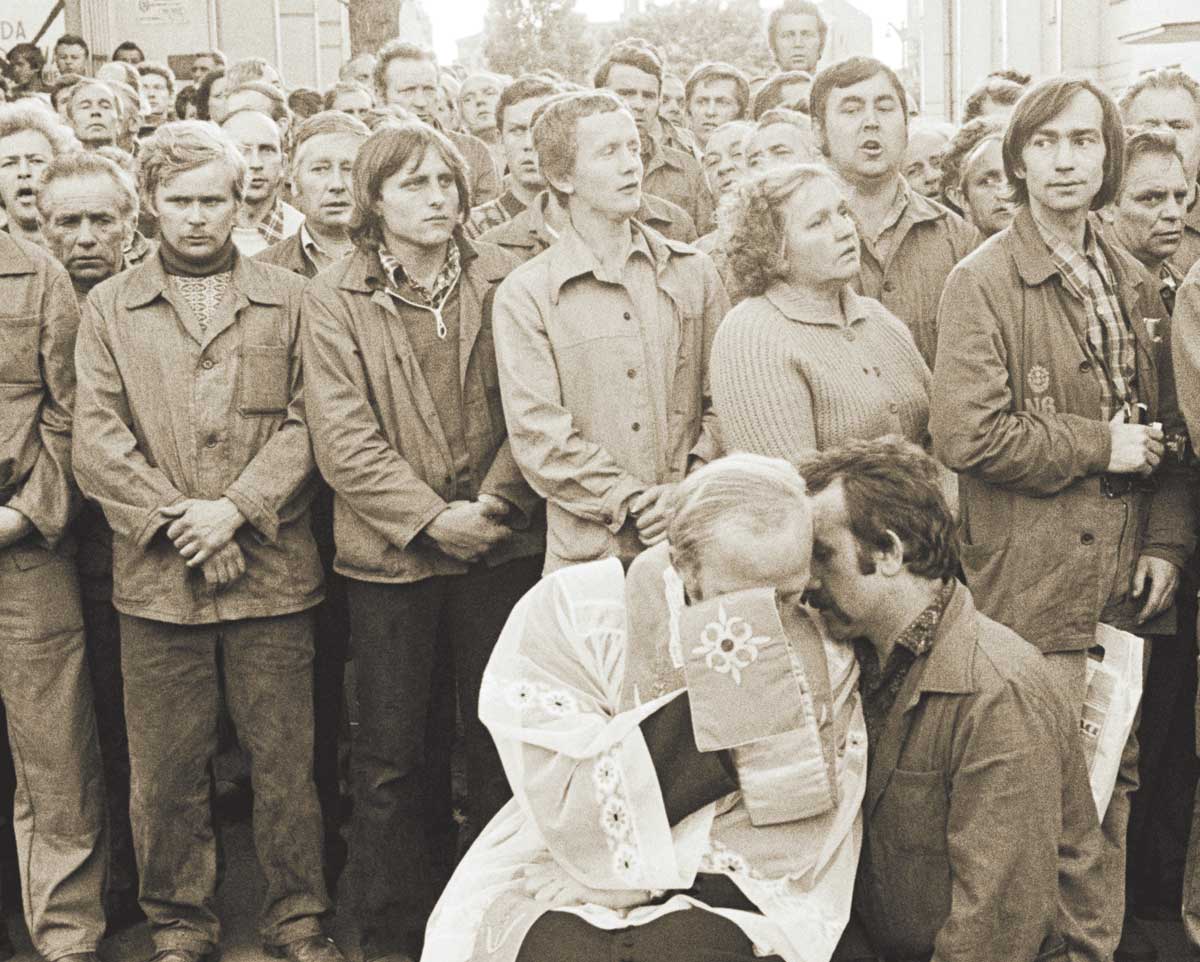
19.10—December 2006
Workers of Another World United
A Personal Commemoration of Poland’s Solidarity 25 Years Later by John Harmon McElroy
calling all readers
Please Donate
"There are magazines worth reading but few worth saving . . . Touchstone is just such a magazine."
—Alice von Hildebrand
"Here we do not concede one square millimeter of territory to falsehood, folly, contemporary sentimentality, or fashion. We speak the truth, and let God be our judge. . . . Touchstone is the one committedly Christian conservative journal."
—Anthony Esolen, Touchstone senior editor






